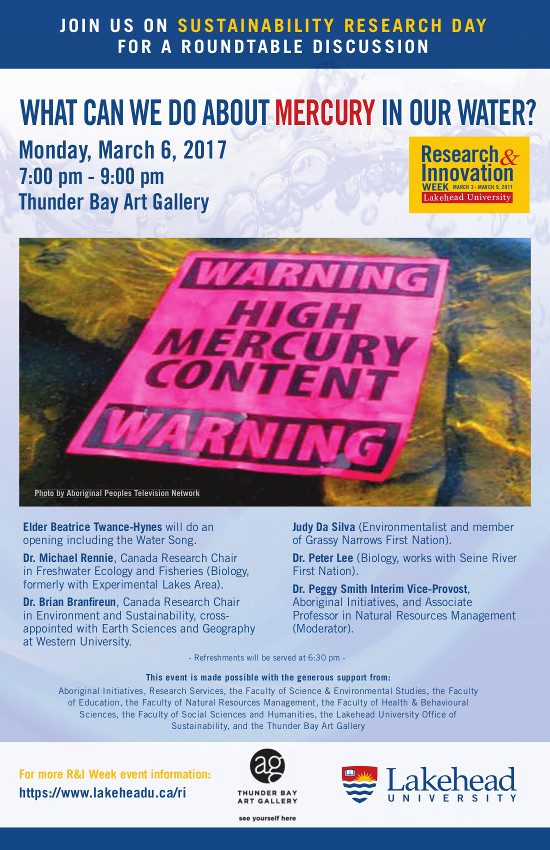Lakehead University hosting discussion on the impact of mercury contamination
February 28, 2017 – Thunder Bay, ON
Decades-long contamination of the Wabigoon-English River system in the Kenora area has been an ongoing environmental and medical concern for the nearby First Nation communities, but high levels of mercury is an issue that impacts more than any one place, researchers say.
“It’s not just a local area or a local source that’s causing the contamination,” says Dr. Peggy Smith, Lakehead University’s Interim Vice-Provost (Aboriginal Initiatives) and an associate professor in Natural Resources Management.
“It’s a universal problem.”
The impact of high levels of mercury will be the subject of a roundtable discussion March 6 as part of Lakehead’s Research and Innovation Week activities.
“It’s a persistent issue that we’ve known about since the 1960s,” explains Dr. Michael Rennie, one of the speakers.
“We know there are issues with mercury poisoning — how it’s transported — yet we’re still in a situation where we can look around at different parts of the world, including Lake Superior, and see that mercury concentrations in fish are still on the rise. What do we need to do about that? Should we be concerned and how much should we be concerned?”
Rennie, an assistant professor in Lakehead’s Department of Biology, is Canada Research Chair in Freshwater Ecology and Fisheries.
Along with Rennie, the roundtable speakers are:
- Dr. Peter Lee, director of Lakehead’s Environmental Laboratory and Aquatic Toxicity Research Centre. He specializes in wetlands ecology, plant nutrient requirements and aquatic toxicology. He’s been involved in the study of mercury contamination along the Seine River.
- Dr. Brian Branfireun, a Canada Research Chair in Environment and Sustainability, holds posts in Biology and Earth Sciences at London’s Western University. He has conducted research at the Experimental Lakes Area and is involved in discussions regarding clean-up of the Wabigoon-English River system.
- Judy Da Silva is an environmentalist and member of the Grassy Narrows First Nation.
Smith will serve as moderator.
Grassy Narrows, located 80 kilometres north of Kenora, has suffered the effects of airborne emissions of mercury and effluent discharge into the Wabigoon-English rivers dating to the 1960s from a Dryden paper mill. One study says 90-per-cent of residents there and at nearby Whitedog First Nation show symptoms of mercury poisoning.
“It’s had bad health effects throughout the community,” Da Silva says. “We’re being diagnosed with different diseases, all mercury-related.”
She said about half the members of her community are afflicted in some obvious way, with the most extreme cases suffering from dementia, ALS and Parkinson’s.
“The general feeling on the reserve is that of an underlying, slow sadness and hopelessness,” Da Silva says.
Mercury contamination is also an ongoing issue with old iron ore mines, such as the open pits near Atikokan, as well as coal-fired power plants. A U.S. study released last fall found mercury contamination is widespread across western North America in the air, soil, lake sediments, plants, fish and wildlife.
“There is,” Rennie says, “a human health issue here that people need to worry about.”
The sustainability roundtable discussion, titled What Can We Do About Mercury in Our Water?, is set for Monday, March 6, from 7-9 p.m., at the Thunder Bay Art Gallery.
The public is welcome.
– 30 –
Media: For more information or to arrange interviews, please contact Brandon Walker, Media Relations Officer, at (807) 343-8177, or mediarelations@lakeheadu.ca.
Lakehead University has about 9,700 full-time equivalent students and 2,000 faculty and staff in 10 faculties at two campuses in Orillia and Thunder Bay, Ontario. Lakehead is a fully comprehensive university: home to Ontario’s newest Faculty of Law in 44 years, the Northern Ontario School of Medicine, and faculties of Engineering, Business Administration, Health & Behavioural Sciences, Social Sciences & Humanities, Science & Environmental Studies, Natural Resources Management, Education, and Graduate Studies. In 2016, for the second consecutive year, Re$earch Infosource ranked Lakehead first among Canada’s undergraduate universities. Visit www.lakeheadu.ca.


